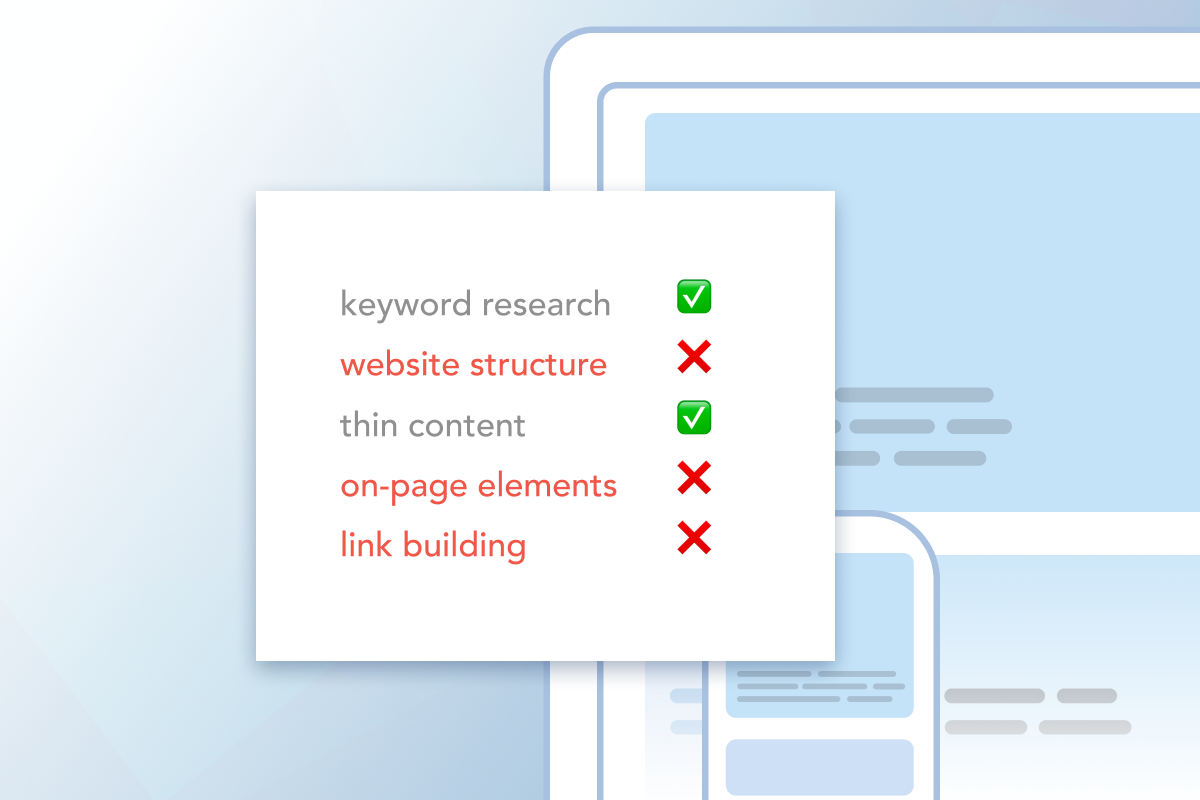Search Engine Optimization (SEO) is a vital component of any successful online presence. It helps businesses improve their website’s visibility, drive organic traffic, and ultimately increase conversions. However, even the most well-intentioned website owners often fall into common SEO pitfalls that can hinder their efforts and prevent them from achieving their desired results.
In this comprehensive guide, we will explore the most prevalent SEO mistakes and provide expert solutions to fix them, ensuring that your website is optimized for maximum search engine performance.
Mistake 1: Neglecting keyword research
Keyword research is the foundation of a successful SEO strategy. Neglecting this crucial step can severely limit your website’s visibility in search engine results pages (SERPs). To avoid this mistake, start by utilizing keyword research tools such as Google Keyword Planner, SEMRush, or Moz’s Keyword Explorer. These tools will help you identify relevant keywords that align with your content and target audience. Look for high-volume keywords that have relatively low competition. Incorporate these keywords naturally into your website’s titles, headings, meta descriptions, and content. Remember, the goal is to strike a balance between optimization and user experience.
Furthermore, don’t limit your keyword research to a one-time activity. Continuously monitor keyword trends, changes in user search behaviour, and emerging industry terms. Regularly update your keyword strategy to stay ahead of the competition and capture new opportunities.
Understanding search intent is paramount when conducting keyword research for SEO. Search intent refers to the underlying motivation or purpose behind a user’s search query. By deciphering the intent behind a specific keyword or search phrase, you can tailor your content and optimize your website to provide the most relevant and valuable information that satisfies the user’s needs.
Different types of search intent, such as informational, navigational, transactional, and commercial, indicate the user’s specific goal, whether it’s seeking information, finding a specific website, making a purchase, or comparing products. Aligning your keyword strategy with the search intent of your target audience ensures that you attract highly qualified organic traffic, enhance user experience, and improve your chances of converting visitors into customers.
In essence, understanding search intent allows you to create a seamless user journey from search query to your website, ultimately mitigating the common pitfalls and boosting your visibility, rankings, and overall SEO success.
Mistake 2: Poor website structure and navigation
A well-structured website with intuitive navigation not only enhances user experience but also helps search engines understand and index your content more effectively. Neglecting website structure and navigation is a common mistake that can lead to a poor user experience and hamper your SEO efforts.
To fix this mistake, start by ensuring that your website follows a logical hierarchy with clear categories and subcategories. This hierarchical structure allows both users and search engine crawlers to navigate your site easily. Additionally, pay attention to your URL structure. Use descriptive and keyword-rich URLs that reflect the content of each page.
For example, instead of:
www.yourwebsite.com/page1.htmlUse:
www.yourwebsite.com/category/subcategory/page-titleThis practice not only helps with SEO but also makes your URLs more user-friendly.
Invest time in designing a user-friendly navigation menu. It should be intuitive, easily accessible, and prominently displayed on your website. A clear navigation menu allows visitors to find the information they are looking for quickly, improving user satisfaction and engagement. Moreover, search engines can crawl and index your website more effectively when the navigation is clear and organized.
Mistake 3: Thin or duplicate content
Content is the lifeblood of SEO. Thin or duplicate content can have detrimental effects on both user experience and search engine rankings. Thin content refers to pages with low word count, lack of depth, and little value to the user. Duplicate content refers to identical or very similar content found on multiple web pages, either within your website or across different domains.
To avoid the mistake of thin content, focus on creating unique, informative, and valuable content that caters to the needs of your target audience. Conduct thorough research on your topic, delve into different angles, and provide in-depth insights that differentiate your content from others. Aim to be the go-to resource in your niche by offering comprehensive guides, case studies, expert opinions, and actionable tips.
Regularly audit your website to identify and remove any duplicate content. Duplicate content can arise unintentionally, such as through boilerplate text, printer-friendly versions of pages, or multiple URL variations. To address this issue, implement canonical tags. Canonical tags indicate the preferred version of a page and help search engines understand which version to index. By consolidating duplicate content under a single canonical URL, you can ensure that your content gets properly indexed and avoids any duplicate content penalties.
Mistake 4: Ignoring on-page optimization
On-page optimization refers to optimizing individual web pages to improve their visibility in search results. Ignoring this aspect of SEO is a significant mistake that can hinder your website’s performance and prevent it from ranking well.
To fix this mistake, ensure that every page on your website has unique and descriptive meta tags, including meta titles and meta descriptions. These meta tags provide concise information to search engines and users about the content of the page. Craft compelling meta titles that incorporate relevant keywords and accurately describe the page’s content. Use meta descriptions to entice users to click through by highlighting the value they will gain from visiting your page.
Optimize your heading tags (H1, H2, etc.) to provide a clear structure to your content. Use H1 tags for the main heading of the page, and use H2 and H3 tags for subheadings. Incorporate relevant keywords naturally within these heading tags to provide further context to search engines.
In addition to meta tags and heading optimization, focus on optimizing your content for readability and engagement. Break up your content into smaller paragraphs, use bullet points and numbered lists, and incorporate relevant images and multimedia elements. By making your content more accessible and engaging, you can improve user experience and encourage visitors to stay on your site longer, ultimately boosting your search engine rankings.
Include internal links within your content to connect related pages on your website. Internal linking helps search engines discover and index other pages on your site, while also spreading link equity throughout your website. When adding internal links, use descriptive anchor text that provides context to both users and search engines about the linked page’s content.
Mistake 5: Neglecting link building
Link building plays a pivotal role in SEO by establishing your website’s authority and credibility. Neglecting link building is a common mistake that can significantly hinder your organic search rankings.
To fix this mistake, develop a robust link building strategy. Start by identifying authoritative and relevant websites in your industry. Look for opportunities to guest blog on these websites, contribute expert insights, or collaborate on content creation. Guest blogging allows you to showcase your expertise, reach a wider audience, and acquire valuable backlinks to your website.
Reach out to influencers and industry thought leaders to establish relationships and seek opportunities for collaborations. By leveraging their authority and network, you can gain valuable backlinks and attract more organic traffic to your website.
Another effective strategy for link building is creating high-quality and shareable content. By consistently producing valuable content, you increase the likelihood of others naturally linking to your website. Invest time and effort in crafting comprehensive guides, in-depth articles, infographics, and original research. Promote this content through your social media channels, email newsletters, and outreach efforts to gain visibility and attract organic backlinks.
Regularly monitor your backlinks using tools like Ahrefs or Majestic. These tools provide insights into your website’s link profile, including the number of backlinks, referring domains, and anchor text distribution.
Conclusion
By avoiding common SEO mistakes and implementing the solutions provided in this guide, you can optimize your website effectively and improve its search engine performance. Remember to conduct thorough keyword research, maintain a well-structured website with intuitive navigation, create valuable and unique content, optimize on-page elements, and actively build quality backlinks. SEO is an ongoing process, so regularly monitor your website’s performance, adapt your strategies to industry changes, and continuously strive for improvement. By following these expert tips, you can pave the way for long-term SEO success and drive organic growth for your online business.
Looking for SEO support? Connect with our team today to see how we can help you reach your goals.


